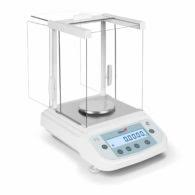How to Maintain and Calibrate Your Lab Scale for Long-Term Accuracy
Even the best laboratory scales can become inaccurate over time. Learn how to properly maintain and calibrate your analytical balance to ensure precision and compliance in Ahmedabad labs.
7/23/20251 min read


Introduction
In the lab, precision isn’t optional — it’s essential.
Even a top-quality analytical balance or precision lab scale can lose accuracy if not properly maintained and calibrated. Whether you're running a pharmaceutical lab in Ahmedabad, a chemical plant in Baroda, or a university lab in Gandhinagar, your weighing results must be consistent, traceable, and audit-ready.
At Shree Shree Weighing Solutions, we not only supply NABL-compliant laboratory scales across Gujarat — we also provide expert calibration and maintenance support.
Here’s your essential guide to keeping your lab scale in peak condition.
⚖️ Why Maintenance Matters
Over time, exposure to:
Dust
Airflow
Chemical vapors
Humidity
Electrical fluctuations
…can cause your lab scale to:
Drift from calibration
Become unstable
Display inaccurate readings
Fail during audits or validations
🔧 Key Maintenance Tips for Lab Scales
Keep the Balance on a Stable Surface
Use an anti-vibration table or granite slab. Avoid wood or metal surfaces that move or shake.Use the Draft Shield Correctly
Always close the glass draft shield before taking a reading to avoid air disturbance.Handle Weights with Tweezers or Gloves
Oils or fingerprints on test weights can cause minor deviations.Clean Gently and Frequently
Use a dry, soft cloth or a brush. Never use water or harsh chemicals near the pan or display.Avoid Overloading
Even once. Repeated overloading permanently damages the internal loadcell.
🧪 Calibration: What You Need to Know
External Calibration:
Done using certified weights. Ideal for labs where balances are moved often.
Internal Calibration:
Auto-calibration using built-in motor weights. Great for high-precision, high-frequency usage.
🛠️ When Should You Calibrate?
Daily (for analytical balances with 0.0001g sensitivity)
Weekly (for general-purpose lab scales)
After relocation
After power outages or voltage fluctuations
Before any major test or audit
📋 NABL-Traceable Calibration with Shree Shree
We offer:
Calibration by certified experts
NABL-traceable certificates
Annual Maintenance Contracts (AMC)
On-site stamping from Legal Metrology (on request)
